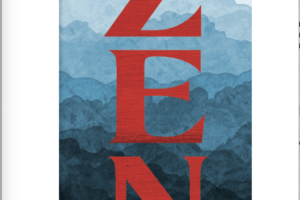“Connecting the Dots”
Zen in Our Time
My time is not yours
your time is not mine either —
is there time, really?
As I mentioned in the last installment, when thinking about content for the next Dharma Byte or UnMind podcast, I turn to my collaborators for inspiration: Hokai Jeff Harper, publisher of the newsletter, and Shinjin Larry Little, producer of the podcast. Jeff responded to a recent call for suggested topics with:
- To everything there is a season
- The wax and wane of householder zazen practice
- What we are feeling right now IS impermanence manifesting itself
In the last episode I delved into the seeming seasonality of everything as a universal principle. We might take a moment to remind ourselves that seasonality is also considered natural, as the waxing and waning of the four seasons, while somewhat arbitrary as a concept, is considered causal in terms of the natural sciences of biology, botany, and even psychology — as in “seasonal affective disorder.” Arbitrary in the sense that, as Master Dogen says, “You do not call winter the beginning of spring, nor summer the end of spring.” Now that we have gotten off the planet, any middle-schooler knows that the root causes of the seasons is a universal phenomenon. Unless they are being home-schooled by a flat-earther, that is.
In this segment we will take up the second, the waxing and waning of householder practice, moving the discussion to the social level. Which, of course, is part and parcel of our personal sphere of activity and influence.
Whether Hokai meant to point out the usual periodic waxing and waning of our personal commitment to meditation in the context of the many distractions assailing your average householder; or a more societal angle on how householder engagement has grown and diminished over time through the various Eastern countries of origin, compared to its prevalence and intensity in the West modern times, I am not sure. I think it may be more instructive to consider the alternative — monastic practice — and how it colors our perspective on our own, personal options for pursuing the dharma in the midst of life.
Zen householders often harbor a misconception that because we are householders — and not monastics — that we cannot hope to penetrate to the fundamental meaning of the teachings of Buddhism. This seems to be a widely shared meme in the Western culture, perhaps particularly in America. And it is based on a fundamental misconception — namely that the social sphere of Zen trumps the personal sphere —that you can tell a book by its cover, when it comes to Zen practice. But you can’t.
Because we interpret the history of Zen Buddhism as primarily monastic, from its inception in India and its transmission through China, Korea, Japan and the Far East, we presume that the approach of material renunciation — leaving the householder life for that of the mendicant monk, nun, or hermit, or wandering on pilgrimage — is the most effective way, the only way, of recovering our Original Nature, or Buddha Mind.
While traditional prescriptions for practice definitely include divesting ourselves of our dependency upon, and predilection for, the pleasures and problems of our times, the renunciation recommended in Zen is not limited to merely rejecting and replacing one lifestyle for another. It is more a matter of seeing through the delusional aspect of any way of living. Including monasticism. This is true spiritual poverty.
Master Dogen articulated four levels of renunciation that members of his monastic community were either able or unable to embrace, which I have discussed in more detail elsewhere. They range from the ability or inability to relinquish attachment to family, home, inheritance, et cetera, to the inability or ability to relinquish our own opinions and biases regarding our own reality, regardless of outer appearances. The latter — Dogen’s highest level of renunciation — would apply equally to monastic or householder. So apparently the main difference between the two lifestyle choices is that the former is relatively simpler compared to the complexities of the latter. In terms of the ability to realize the truth of Buddhism, lifestyle is just another form of pomp and circumstance.
If you find your practice — by which we usually mean meditation — is waxing and waning beyond your intentions and control, you might want to take a radical departure. Stop. Quit, with all the negative connotations that may have in our goal-oriented culture and society. Admit that you have failed, once again. Or rationalize that Zen may work for others, but it does not work for you.
In doing so — in “not doing Zen” — you will confirm your bias, and prove to yourself that, like everything else you have tried in life, it just didn’t get the job done. Zen did not live up to your expectations. Now that you have resolved that untidy business you can get on with your life. Good luck with that.
It turns out that this kind of discernment, that Zen is something we started doing, so it is something we can stop doing, is a category error of the first degree. There actually is no such thing as “Zen.” Zen is what we call this particular meditation sect of Buddhism, but like any other sect, it only exists as a construction of our societal mind. It is a learned thing that upon examination evaporates like a puff of smoke, or a cloud in the sky.
The etymology of “Zen” is one example of this misinterpretation. As I have pointed out elsewhere, Zen is a misnomer. It is phonetic Japanese for Ch’an, which is phonetic Chinese for Dhyana, which is a traditional form of contemplative meditation that the Chinese pundits assumed Bodhidharma was demonstrating when he would abruptly turn his back on them, facing the mountain wall instead. But the great sage was not doing dhyana. He was not contemplating anything in particular. He was demonstrating what is referred to in Japanese as shikantaza, which according to Master AI, means:
Shikantaza, often translated as “just sitting,” is a foundational Zen practice that involves sitting in a quiet, meditative posture without focusing on any specific object or thought. It’s about being present, aware, and simply experiencing the present moment.
If even this barebones definition does not capture the implications of the term, we have no one to blame but an artificial intelligence summarizing who knows how many verbal references on the large language model on which it has been trained. Defined as:
A large language model (LLM) is a type of artificial intelligence that can generate human-like text based on the context provided. LLMs are trained on vast amounts of text data and learn to predict the next word or sequence of words in a text, allowing them to perform tasks like natural language processing, machine translation, and content generation.
So it has come to this. We are using artificial intelligence to define artificial intelligence.
With such developments as AI adding to the present overload of distractions, threats, alternative career choices, endless learning curves, and entangling relationships at home, work and play that householders have on their plates today, we can be forgiven for developing some ambiguity around adding, or continuing to follow, yet another demanding regimen — Zen — to the list. Again, category error.
We are already practicing Zen, from the moment we are born — and even before we are born, in the traditional Buddhist view — whether we know it or not. Everybody else is likewise. “Zen” is what we call that fact. Zen is a word that points at something that is not a thing, and in fact does not exist as an isolate or instantiation of anything. It is “the whole catastrophe” to quote Zorba the Greek. If Bodhidharma was contemplating anything, it was everything, which beggars the concept of “contemplation.”
In closing, let me quote myself again, from my closing statement from the last segment:
Next month we will take up the second suggestion, the waxing and waning of householder zazen practice. Been there, done that.
“Been there, done that” is not exactly true. I never began Zen practice, it began me. And I will never quit, though it may appear to be so to the outside observer. Zen is not something we can do. It is not in the realm of doing. So we cannot stop doing it, either. We either do it poorly or do it relatively well, like most things in life. Zazen is not something we have to do; it is something we get to do. Zen cannot wax and wane; it only seems to in our imagination. Perversely, there is no choice in the matter. The worse it gets, the better it is. “The Great Way is not difficult for those who have no preferences.” Including a preference for what we think is Zen. That is not the real Zen.










Leave a Reply
Your email is safe with us.